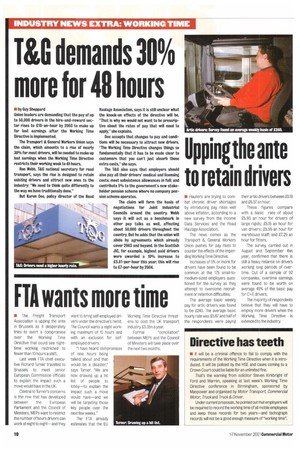T14,0 demands 30% more for 48 hours
Page 10

If you've noticed an error in this article please click here to report it so we can fix it.
• by Guy Sheppard Union leaders are demanding that the pay of up to 50,000 drivers in the hire-and-reward sector rises to 210-an-hour by 2003 to make up for lost earnings after the Working lime Directive is implemented.
The Transport & General Workers Union says the claim, which amounts to a rise of nearly 30% for most drivers, will be needed to make up lost earnings when the Working Time Directive restricts their working week to 48 hours.
Ron Webb, T&G national secretary for road transport, says the rise is designed to retain existing drivers and attract new ones to the industry: "We need to think quite differently to the way we have traditionally done."
But Karen Dee, policy director of the Road Haulage Association, says it is still unclear what the knock-on effects of the directive will be. "That is why we would not want to be prescriptive about the rates of pay that will need to apply," she explains.
Dee accepts that changes to pay and conditions will be necessary to attract new drivers. The Working Time Directive changes things so fundamentally that it has to be made clear to customers that you can't just absorb those extra costs," she say& The T&G also says that employers should also pay all their drivers' medical and licensing costs; meet subsistence allowances in full; and contribute 5% to the government's new stakeholder pension scheme where no company pension scheme operates.
The claim will form the basis of negotiations for Joint Industrial Councils around the country. Webb says it will act as a benchmark in other pay talks as well, affecting about 50,000 drivers throughout the country. But he adds that the union will abide by agreements which already cover 2003 and beyond. In the Scottish JIC, for example, highest paid drivers were awarded a 10% increase to 25.81-per-hour this year; this will rise to 27-per-hour by 2004.
















































































































































